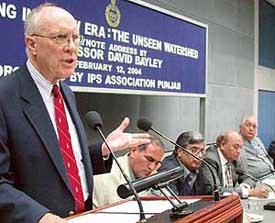Former SCJ Dean is Recalled as Renowned Scholar on Police Reform and Wonderful Colleague

David Bayley pauses for a photo in late 2015, just before leaving the Albany area for retirement in Ohio.
ALBANY, N.Y. (June 23, 2020) — The death on May 10 of Distinguished Professor Emeritus David H. Bayley, 87, one of the world’s leading authorities on policing, came just weeks before the police killings of George Floyd in Minneapolis and Rayshard Brooks in Atlanta. Longtime School of Criminal Justice (SCJ) colleagues rue that Bayley’s voice will not be prominent in the all-important discussions now emerging on police reform.
“David Bayley’s judgment was universally respected, and his advice solicited and taken by police executives all over the globe,” said Distinguish Professor Emeritus Hans Toch, himself a prolific writer on corrections and criminal offenders. “I wish he was with us now that the profession in which he played a leading role is in such crisis, and his advice consequently is more badly needed than ever.”
Distinguished Teaching Professor James Acker concurred: “In many respects David Bayley’s work offers a blueprint for policing policies and service models that could not be more timely in this turbulent era.”
Bayley, who joined Toch and several other already eminent scholars at SCJ in 1985, served as school dean from 1995-2004 and retired in 2010, completing an academic career that spanned seven decades. He remained in Albany five more years, working on his 18th book, Governing the Police: Experience in Six Democracies (Transaction Press); it was released in 2016.
 |
|
David Bayley speaks at a seminar on “Policing in a New Era: the Unseen Watershed” in Chandigarh, India, in February of 2004. |
In a 2015 article for Police Practice and Research, Richard Heslop, a lecturer in criminology at Bournemouth University, U.K., described Bayley as “America’s principal, most respected and longest serving policing expert at-large and the world’s preeminent scholar of international policing studies.”
Heslop noted that Bayley’s academic work became the practical foundation for promoting fair and democratic policing. He also contributed to new policing policies in the aftermath of political conflict in Bosnia and Northern Ireland. He received the Order of the Rising Sun, Golden Rays with Neck Ribbon from the government of Japan for his career contributions.
UAlbany colleagues noted personal qualities that equaled Bayley’s achievements as a scholar.
“David Bayley was a mentor and friend to me,” said William Pridemore, Distinguished Professor and former SCJ dean. “He was on my dissertation committee and was dean when I received my PhD from our school. I communicated with him just a few weeks before he passed. He was a warm, caring, humorous person.”
“A font of wisdom, a civilized man, and a good friend,” said Toch.
“In addition to his many important academic contributions, David was an exemplary educator,” said Acker. “He had a well-deserved reputation for being levelheaded, fair-minded and, indeed, for his innate wisdom. He was a wonderful colleague, a friend, and an insightful and thoroughly decent human being. We encounter people of David's commanding stature and distinction only rarely. We miss him sorely.”
A Fulbright Scholar at Oxford with a PhD in political science from Princeton, Bayley departed Albany in 2016 to return to his native Ohio near the campus of his undergraduate alma mater, Denison University. It was as a student there that he met Anita “Chris” Ellis, who became his wife of 57 years; she died in 2014.




